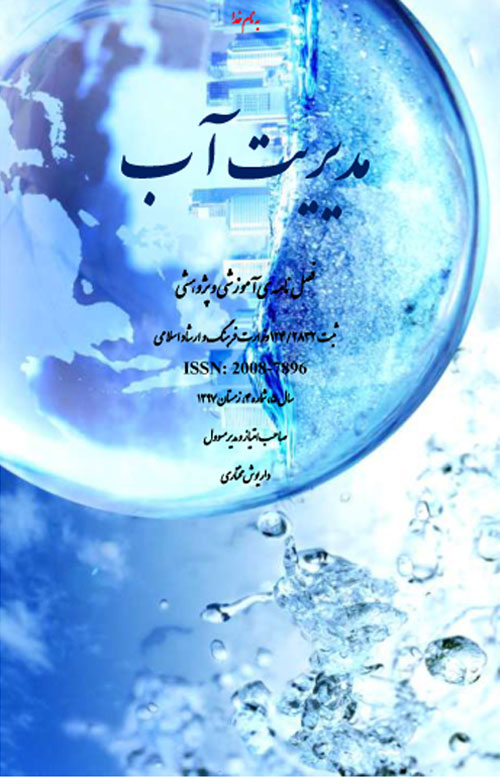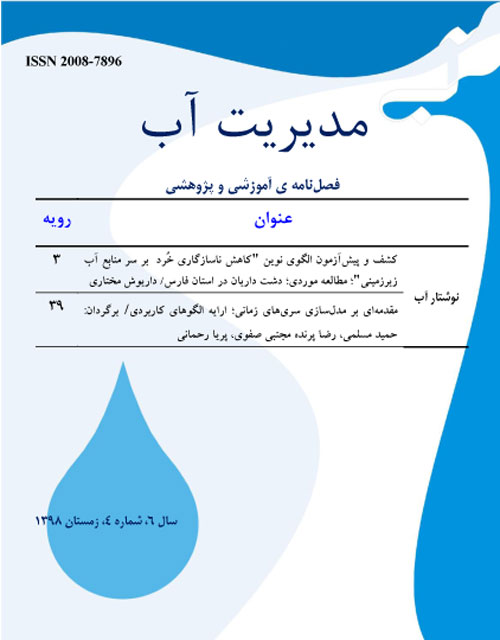فهرست مطالب

نشریه مدیریت آب
سال پنجم شماره 4 (پیاپی 15، زمستان 1397)
- تاریخ انتشار: 1397/12/14
- تعداد عناوین: 3
- نوشتار آب
-
صفحات 3-22
نحوه ی استفاده و مدیریت منابع آبی مشترک به یکی از موضوعات مورد مناقشه در روابط کشورهای دارای رودهای مشترک تبدیل شده که ایران نیز به واسطه داشتن رودهای مشترک، از این قاعده جدا نیست. این پژوهش در نظر دارد روشن نماید که دیپلماسی آبی چه نقشی در تامین منافع ملی و همچنین سیاست خارجی کشور می تواند داشته باشد. در پاسخ به این پرسش از منابع کتابخانه ای و اینترنتی، جمع آوری اسناد و آرشیو استفاده شده است. در این نوشته رودهای مرزی مشترک در مرزهای ایران با عراق و افغانستان مورد بررسی قرار گرفته است. نتایج نشان داد که دولت می تواند با دادن مشوق های اقتصادی همانند استفاده از بندر چابهار و دالان ترانزیتی چابهار-زاهدان-افغانستان و کمک به عراق و افغانستان در دسترسی مناسب به دریاهای آزاد، این دو کشور را به انعقاد معاهدات مناسب در مورد منابع آبی مشترک هدایت کند. از جمله راهکارها برای بهبود دیپلماسی آب در این مناطق، تحرک دیپلماسی آبی کشور برای تدوین قوانین مربوط به رودخانه های مرزی و مذاکرات با طرف عراقی و افغانستان می باشد.
کلیدواژگان: بحران آب، رودخانه های مرزی، دیپلماسی آبی -
صفحات 23-38
وسعه کشاورزی به ویژه کشت گسترده پنبه و گندم در کشور ازبکستان از ده های آغازین قرن 20، زمینه خشک شدن تدریجی دریاچه آرال را فراهم کرده است. افزون بر آن، کشورهای پایین ازبکستان و ترکمنستان) به ، دست (قزاقستان دلیل وابستگی به منابع آب یادشده، پیشنهاد تشکیل یک کنسرسیوم مشترک می دهند که بیشتر، مفهوم مشارکت در مالکیت منابع آب را می دهد .ولی کشورهای بالادست (قرقیزستان و تاجیکستان) به دلیل حس مالکیت بر این منابع با آن مخالفند و به دنبال تامین منافع خود مانند دریافت گاز، زغال سنگ و برق از کشورهای پایین دست می باشند. چندین تفاهم نامه همکاری بین این کشورها به امضاء رسیده است. یافته های این پژوهش که با کمک مطالعات کتابخانه ای انجام گرفته است نشان می دهد که در صورت عملی نشدن راهکارهای موجود، به دنبال گسترش خشکسالی دریاچه آرال، آلودگی شدید منابع آبی و افزایش بی رویه جمعیت، در آینده نزدیک باید شاهد درگیری های نظامی بر سر منابع آبی در این حوزه بود.
کلیدواژگان: بحران آب، آسیای مرکزی، شوروی، دریاچه آرال -
صفحات 39-62
در این نوشته، دیدگاه دو طیف باورمندان و ناباوران به نجات بقایای آبخوان های کشور، از دریچه دیالکتیک، واکاوی می شود. این واکاوی نشان می دهد که گره و قفل ذهنی در چالش دیالکتیکی مساله بین دو گروه ناباوران و باورمندان، پیرامون امنیت ملی است و چنانچه تعریف مناسبی از امنیت ملی به ویژه در جایی که امنیت ملی برگرفته از اشتغال و تولید در بخش کشاورزی و همینطور امنیت غذایی است، ارایه شود آنگاه می توان درجات تعارض در چالش یاد شده را کاهش داد. تشخیص دغدغه های ناباوران که مبنای ایستادگی آنان در برابر نجات بقایای آبخوان ها می شود، از دستاوردهای این نوشته است. این نوشته بر پایه تجارب میدانی و کنشگری نگارنده در 17 سال اخیر بوده است.
کلیدواژگان: امنیت ملی، امنیت غذایی، دیالکیتک، آبخوان ها
-
Pages 3-22
How to use and manage shared water resources has become one of the disputed issues in the relations of countries with shared rivers, which Iran is not separated from by the common rivers. This study seeks to clarify what the role water diplomacy can play in national benefits as well as in foreign policy. Library and Internet resources, document collection and archiving have been used to answer this question. This paper examines the common border rivers on the Iranian border with Iraq and Afghanistan. The results showed that the government could provide economic incentives such as the use of the Chabahar port and the ChabaharZahedan-Afghanistan transit corridor and help to Iraq and Afghanistan for proper access to the high seas this tow country led to adequate contract for shared water resources. Among the strategies to improve water diplomacy in these areas are the country's water diplomacy drive to develop border-related river laws and negotiations with the Iraqi and Afghan sides.
Keywords: Water crisis, Boundary rivers, Water diplomacy -
Pages 23-38
Agricultural development, especially the extensive cultivation of cotton and wheat in Uzbekistan since the early decades of the 20th century, has provided the basis for the gradual drying up of Lake Aral. In addition, downstream countries (Kazakhstan, Uzbekistan, and Turkmenistan) are proposing to form a joint consortium because of their dependence on water resources, have been given suggestion for participatory union which further give the concept of ownership of water resources. But upstream countries (Kyrgyzstan and Tajikistan) oppose it because of the sense of ownership of these resources and seek to secure their benefits such as receiving gas, coal and electricity from downstream countries. Several Memorandums of Understanding have been signed between these countries. The findings of this study, which are supported by library studies, suggest that, if existing solutions are not implemented following the expansion of the Aral Lake drought, severe pollution of water resources and overcrowding, the population should increase, in the near future, we should be witnessed military conflicts over water resources in the area.
Keywords: Water Crisis, Central Asia, Soviet Union, Lake Aral -
Pages 39-62
In this essay, two perspectives of believers and unbelievers on the salvation of the aquatic remnants of the country, from the dialectic, are analyzed. This analysis shows that the knot and subjective lock in the dialectical challenge of the problem between the unbelievers and the believers is about national security, and if is provided a proper definition of national security, especially where national security derives from employment and production in agriculture as well as Food security, then the degree of conflict in the challenge can be reduced. One of the achievements of this paper is to identify the concerns of the disbelievers, which are based on their resilience to rescuing aquifer remains. This post is based on the author's fieldwork and activism experiences over the last 17 years.
Keywords: National Security, Food Security, Dialectic, Aquifer


